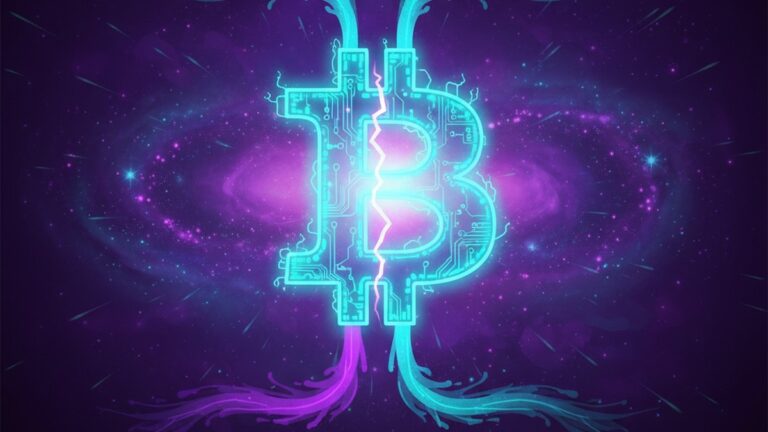The Bitcoin community is no stranger to heated debates and technical disputes, but the latest developments suggest a potential shake-up that could reverberate throughout the cryptocurrency world. Renowned Bitcoin developer Luke Dashjr is reportedly considering initiating a hard fork, a move that could lead to the creation of a new Bitcoin variant. As the crypto community watches closely, the implications of such a split are generating a mix of excitement, trepidation, and curiosity.
A Brewing Dispute
The catalyst for this potential hard fork stems from deep-seated disagreements within the Bitcoin community regarding protocol changes and network upgrades. These disputes aren’t new, but the recent discussions have reached a boiling point, with Dashjr advocating for changes that some believe are necessary to preserve Bitcoin’s original vision. These changes, however, are not universally accepted, leading to the possibility of a hard fork as a way to implement them without community-wide consensus.
Dashjr, who has been an influential figure in the Bitcoin development space for years, is known for his staunch commitment to Bitcoin’s foundational principles. His supporters argue that his proposed changes are crucial for maintaining the network’s security and decentralization. Critics, on the other hand, worry that a hard fork could lead to fragmentation, confusion, and potentially harm Bitcoin’s market value.
Why a Hard Fork?
But what exactly would a hard fork entail, and why is it on the table? In simple terms, a hard fork involves splitting the blockchain into two separate paths, resulting in the creation of a new cryptocurrency. This is often done when there is a lack of consensus on major protocol changes. In the past, Bitcoin has witnessed significant forks, such as the creation of Bitcoin Cash in 2017, which arose from disagreements over block size limits.
For Dashjr, the potential hard fork is seen as a last resort to implement changes he believes are vital. These include modifications to Bitcoin’s transaction handling and security protocols. While details remain sparse, it’s clear that Dashjr’s vision for Bitcoin diverges from the current trajectory, prompting this drastic consideration.
Balancing Innovation and Tradition
The debate over Dashjr’s proposal highlights a perennial tension within the cryptocurrency community: balancing innovation with tradition. Bitcoin’s open-source nature means that anyone can propose changes, but getting community-wide acceptance is a different story. On one hand, innovation is crucial for staying relevant in the fast-evolving crypto landscape. On the other, maintaining Bitcoin’s core principles is seen as equally important by many in the community.
Supporters of the hard fork argue that it’s a necessary step to ensure Bitcoin’s long-term viability. They assert that Dashjr’s changes could address existing vulnerabilities and enhance the network’s resilience against potential threats. Moreover, they believe that a new fork could provide a fresh opportunity to experiment with novel features without compromising the original Bitcoin network.
Conversely, opponents caution against the risks associated with a hard fork. They point to previous forks that have led to market volatility, user confusion, and even security issues. The fear is that another fork could dilute Bitcoin’s brand and weaken its position in the competitive cryptocurrency market. Some also express concern that a hard fork could deepen divisions within an already fragmented community.
Community Reactions and Market Impact
As the possibility of a hard fork looms, reactions within the Bitcoin community have been mixed. Online forums and social media platforms are abuzz with discussions, as users debate the potential outcomes and express their support or opposition to Dashjr’s proposal. Prominent figures in the crypto space have weighed in, with some endorsing the hard fork as a bold step forward, while others caution against its potential fallout.
The market impact of a hard fork is another aspect that has everyone on edge. Historically, Bitcoin’s price has shown sensitivity to major developments and announcements. A hard fork could lead to increased volatility as traders and investors react to the uncertainty. On the flip side, it could also spur interest and investment in the new cryptocurrency, depending on how the market perceives its value proposition.
Looking Ahead
As of now, it’s unclear whether Luke Dashjr will proceed with the hard fork or if a compromise can be reached within the community. What is certain, however, is that the coming weeks will be pivotal for Bitcoin’s future. The outcome of this dispute could set a precedent for how contentious issues are navigated within decentralized networks.
For now, the Bitcoin community remains in a state of anticipation, with many closely monitoring developments and preparing for potential scenarios. Whether Dashjr’s hard fork will materialize or if the community will find a way to bridge their differences without splitting the network, one thing is clear: the debate underscores the vibrant, albeit occasionally contentious, nature of the cryptocurrency world.

Steve Gregory is a lawyer in the United States who specializes in licensing for cryptocurrency companies and products. Steve began his career as an attorney in 2015 but made the switch to working in cryptocurrency full time shortly after joining the original team at Gemini Trust Company, an early cryptocurrency exchange based in New York City. Steve then joined CEX.io and was able to launch their regulated US-based cryptocurrency. Steve then went on to become the CEO at currency.com when he ran for four years and was able to lead currency.com to being fully acquired in 2025.


